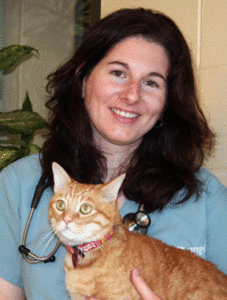-
Adopt
-
Veterinary Care
Services
Client Information
- What to Expect – Angell Boston
- Client Rights and Responsibilities
- Payments / Financial Assistance
- Pharmacy
- Client Policies
- Our Doctors
- Grief Support / Counseling
- Directions and Parking
- Helpful “How-to” Pet Care
Online Payments
Referrals
- Referral Forms/Contact
- Direct Connect
- Referring Veterinarian Portal
- Clinical Articles
- Partners in Care Newsletter
CE, Internships & Alumni Info
CE Seminar Schedule
Emergency: Boston
Emergency: Waltham
Poison Control Hotline
-
Programs & Resources
- Careers
-
Donate Now
 Mara Ratnofsky, DVM
Mara Ratnofsky, DVM
Angell General Medicine Service
angell.org/generalmedicine
617-522-7282
Congrats – you adopted a new puppy! Here are some helpful tips on getting off to a good start and raising a happy, healthy dog.
Vaccinate
Puppies are susceptible to a variety of life-threatening diseases – distemper, parvovirus, and rabies to name a few. The good news is that safe and effective vaccines are available to help protect your dog. Vaccines are usually administered to puppies every 2-4 weeks until they are 16 weeks old. Rabies and DHP (distemper, parvo, and adenovirus combination vaccine) are considered core vaccinations, meaning they are recommended for all dogs. Non-core vaccinations against “kennel cough,” leptospirosis, and Lyme disease are available for dogs who will be at risk based on their lifestyle (such as those boarding, swimming in ponds, or running through tick-infested areas, respectively). Discuss vaccine options with your veterinarian to create a vaccine protocol which is right for you and your dog. Make sure your dog avoids interaction with unknown dogs until fully vaccinated.
Prevent Parasites
There are many illnesses that can result from parasitic infection. The ticks in New England often carry the organisms which cause Lyme disease and anaplasmosis. Mosquitos are responsible for the transmission of heartworm disease – a life threating infection in which worms live in the blood vessels around a dog’s heart and lungs. Fleas can cause severe discomfort and skin infection in dogs, and can bite people as well. Intestinal worms can cause diarrhea, anemia, and malnutrition. Talk to your veterinarian about which parasite preventatives are appropriate for your pet.
Dogs are social creatures, however they sometimes need help learning how to behave in certain social situations. Puppies between 2-14 weeks of age are considered to be in the critical socialization period. It is especially important during this time to expose your new dog to all sorts of stimuli. He or she should meet people of different shapes and sizes, see other animals, hear loud noises, watch moving cars go by, have nails trimmed and ears cleaned, etc. Make sure to reward appropriate behavior by offering your pup’s favorite treats. Lack of exposure during the critical period can result in a fearful, and possibly fear-aggressive, dog. Puppy classes offered by a reputable facility are a great way to socialize and train your dog, as the other dogs will need to be healthy and vaccinated in order to participate. Training should be reward-based, such as giving a treat and praise when your puppy sits on command. Use of punishments such as squirting with water or shocking with a shock collar has been shown to increase fear in dogs and can lead to more aggressive behavior.
Exercise
It is often said that a tired dog is a good dog. Exercise helps dogs remain calm and decreases the likelihood of destructive behavior. It also is a great time to bond with your new pet. Play catch in the yard or go for walks together. Puppies should have several short play sessions per day, such as two or three 20 minute walks and one or two sessions of fetch. Many veterinarians recommend waiting until your dog’s skeleton is mature before going for serious runs in order to prevent long-term orthopedic damage. Skeletal maturity occurs between 12-15 months of age in most large dogs. Mental exercise is also very important, and many dogs behave better when they have a “job” to do. Try hiding kibble in a Kong or other hard rubber toy so your dog has to work to obtain food. There are also toys available that require your dog to figure out a puzzle in order to find a food reward.
Nutrition
A complete and balanced diet is extremely important for your dog. Some people see the value in a grain-free diet, while others will happily feed wheat and corn as long as they are organic, and still others will only feed food created specifically for their breed of dog. All of these preferences are fine, but just make sure the food you purchase states that it has passed AAFCO feeding trials. This certification by the Association of American Feed Control Officials ensures that the food meets minimum nutritional requirements for a particular life-stage and that animals do well when fed the food. Of particular importance is choosing an appropriate diet for a large or giant breed puppy. These dogs should be fed a large-breed puppy food to control their growth rate and lower the risk of skeletal abnormalities. Additional vitamin supplements should definitely be avoided unless recommended by your veterinarian. Overfeeding should be avoided for all dogs, as it increases the risk of a wide variety of diseases. In addition, overfeeding of large or giant breed puppies creates large but relatively weak skeletons which then have to support a heavier than ideal body. Developmental orthopedic disease may result.
Work with your veterinarian to take good care of the newest member of your family, and you will hopefully enjoy many wonderful years together!
For information about Angell’s General Medicine service, please visit www.angell.org/generalmedicine or call 617-522-7282.
